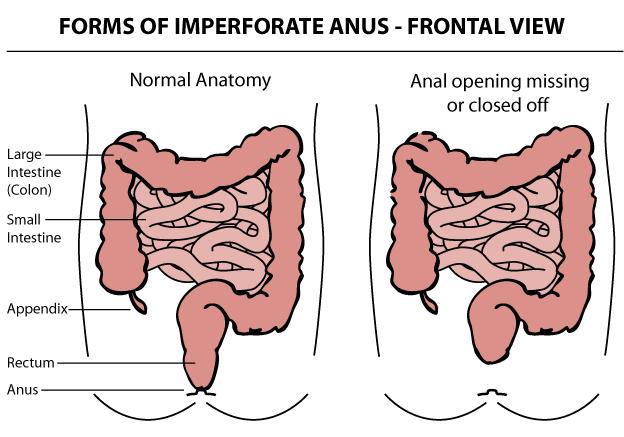
An imperforate anus (IA) is when there is defect in the opening of the anus from birth. The opening of the anus is either missing or it is blocked. Stools need to pass from the rectum through the anus in order to leave the body via the rectal sphincter. An imperforate anus may present with the rectum ending abruptly and not connecting with the colon or the rectum may have abnormal openings to the urethra, bladder, penis, or vagina. There may also be a narrowing or stenosis of the anus. This problem is caused by abnormal development of the fetus. Symptoms include: the infant not passing stool in the first 24-48 hours after birth, a very small anal opening, a distended abdomen, or stool passing out of the penis, vagina, or urethra. Your pediatrician can diagnosis this in the office or hospital during an exam and an further diagnostic imaging such as an ultrasound, MRI, or CT scan may be necessary. The medical treatment for this is surgical correction of the defect. Unfortunately, severe constipation can result in the post-operative phase. Stool softeners and a high-fiber diet are usually recommended.
How can Pamela Morrison Physical Therapy help after an Imperforate Anus Repair?
At Pamela Morrison Physical Therapy our expert pelvic therapists can assess your infant’s pelvic floor muscle function, neurological status of the area, coccyx mobility, and visceral (organ) mobility/motility to determine the cause of the constipation. The surgery may have resulted in scar tissue adhesions, anal sphincter and/or pelvic floor muscle spasm or overactivity, impaired visceral mobility/motility, change in anorectal angle, and impaired coccyx mobility. A successful treatment plan might include myofascial release, scar mobilization, soft tissue mobilization, visceral manipulation, joint mobilization of the spine, pelvic girdle, coccyx, and hips; Craniosacral Therapy, Integrative Manual Therapy, dietary advice, and positioning. We have had very good success reinstating normal bowel habits within a few treatment sessions.


